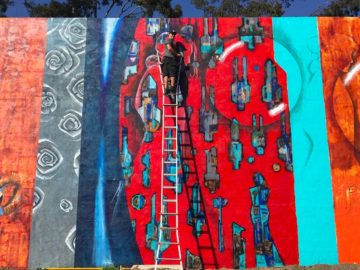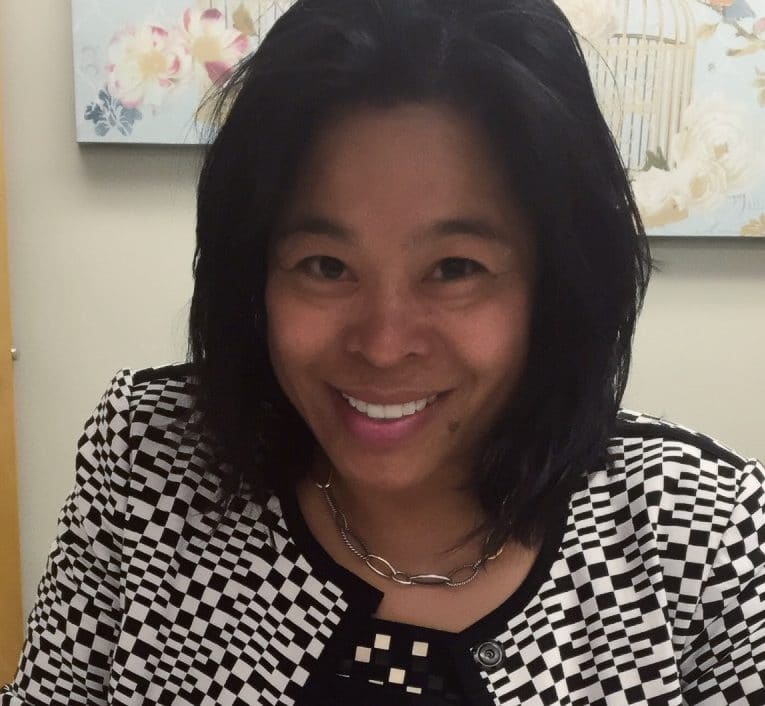
Celine Shimizu on Reclaiming Life After Loss
BY PAKSY PLACKIS-CHENG
Celine Parreñas Shimizu, author, award-winning filmmaker, and professor, recently accepted a permanent position at the San Francisco State University (SFSU) School of Cinema. After the loss of her youngest son, Celine had to find a way to reconcile life with death. That struggle has made he more sensitive to the struggles of others in her life and in her work.
impactmania spoke with Shimizu about race, sexualities, and gender issues in film; Bruce Lee; and the meaning of equanimity.
Celine, you recently accepted a professorship at SFSU. What are you going to unleash on these unsuspecting students?
I’m very excited to work with SFSU students who are not only talented in terms of identifying this passion for learning how to speak a visual language but are also very hungry. They want meaningful, intense relationships with faculty and with each other so they can make work that really matters.
Many of them are self-supporting or work full time jobs. Whenever I walk into a classroom I want to make sure to give them worthwhile learning experiences. I present them information in a way that reaches them across their exhaustion and across the messiness of life.
In terms of actual content, I bring an experimental understanding of genre, disrespect of disciplinary boundaries, and a focus on social aesthetics or moving image representations of race, sexuality, and gender issues along with training in film history, theory, and criticism.
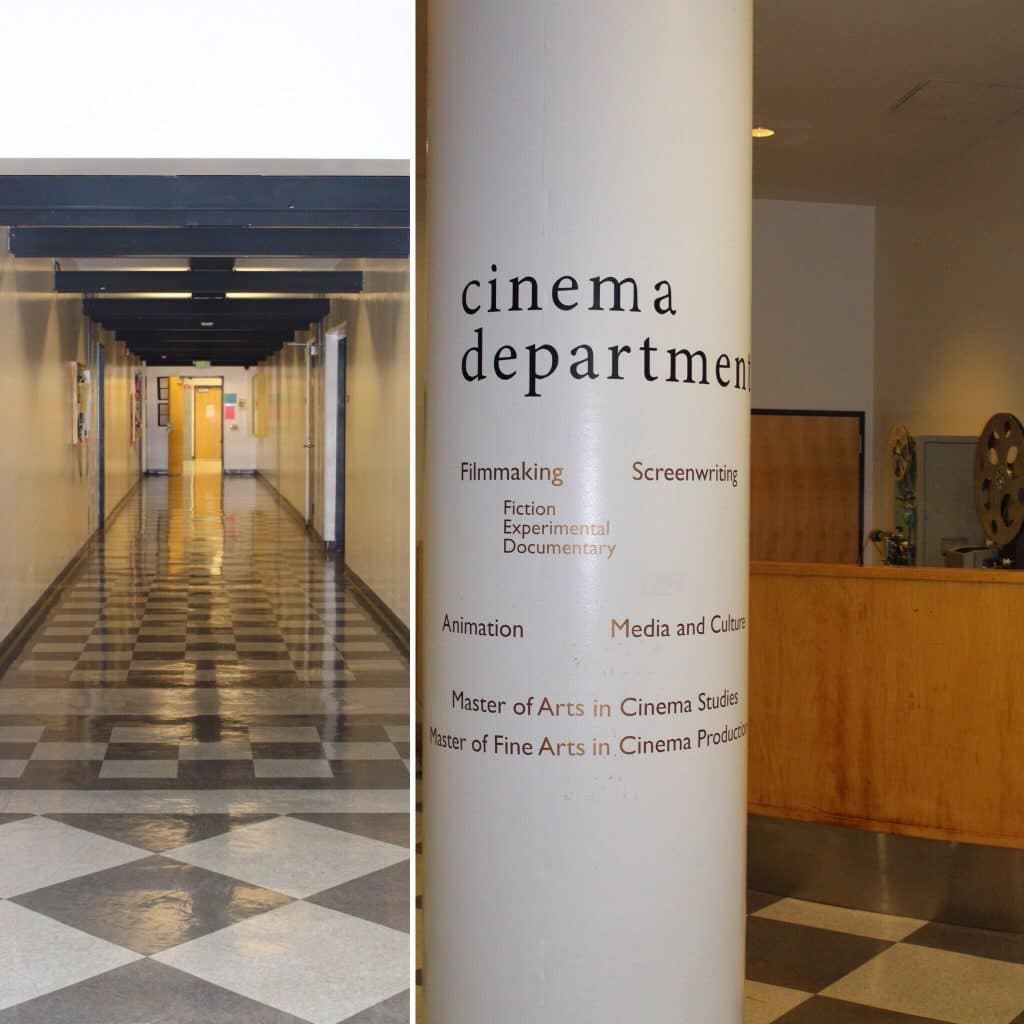
SFSU Cinema Department
Why are issues of race, sexualities, and genders important to you?
These are some of the most important issues of our day because they engage what it means to understand power. Both power that is imposed upon you by institutions and society. But also power that every individual has.
When I teach how these social forces shape lives in the face of constraints, I hope to offer students a way of looking at the world that empowers them, but also help them to understand why they feel oppressed. Or why they feel a responsibility towards others.
Today in my classes, we engage the controversy known as white washing. Why are the Oscars so white? It’s really entered into the popular culture awareness in the past three years or so. But these protests and movements around these issues have existed for decades, if not the past hundred years.
One of my students said, “I’d like to eat a full meal when I go to the movies. I don’t want to sit in the sidelines and eat just a little bit, then my hunger persists and remains.”
The students debate whether they are happy with identifying small pleasures in the face of content that is alienating. They call it settling for “scraps.” They want something more. They want stories about their own lives that are taken seriously, whether it’s about racism, or being silenced, or overcoming disregard.
They want to see better movies…Yeah, so I find that energy and that perspective electrifying in the classroom.
Especially because many of these students, despite their lack of resources at a state school, are taking advantage of an increasingly democratized media industry where they can make movies with their iPhones or make podcasts or write essays and then publish them on their blogs.
So there’s a lot of energy and —it’s very humbling to be a part of.
Two of your sisters are also professors. Rhacel Salazar Parreñas is at University of Southern California (USC) and Juno Salazar Parreñas is at The Ohio State University. Is this a result of sibling rivalry?
It may be a result of sibling love.
My parents and generations of my family are educators. It was impressed upon me that there was post-graduate education. Early on, I understood what it meant to get a master’s degree, a doctorate, a post doc.
The more I grew up, the more I realized as an immigrant political asylee in this country, that education was also the way up and out — from living in the projects in Massachusetts. My parents weren’t really around when I was in high school because they were working two jobs.
School was very important to my sisters and me. There was something amazing and wonderful about going to books and knowing what the knowledge that was generated before you.
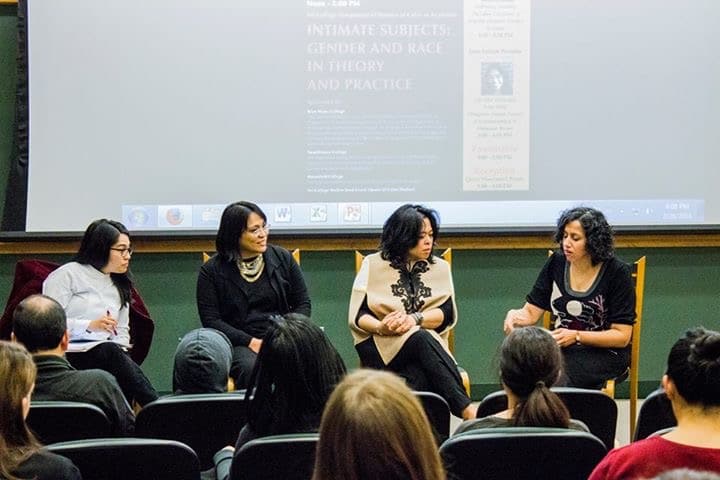
Sister’s Talk. From left to right: Juno Parreñas, Rhacel Rhacel Parreñas and Celine Parreñas Shimizu with Bakirathi Mani at Swarthmore College.
We have very supportive relationships with each other and help each other by listening to each other’s work. Helping each other navigate the profession as well. Because there are so few women of color who are standing in front of students in a lecture hall or in the rooms where faculty govern.
Have you seen a film recently that made an impact on you?
Clouds of Sils Maria (2014) by Olivier Assayas really spoke to me. It stars Juliette Binoche, and Kristen Stewart, and Chloe Grace Moretz. So these white women movie stars. The film is about a legendary actress who is getting older, and she came into stardom performing in a movie about being a young ingénue.
I found this movie really important to me at the time. The young ingénue is now an older woman, who now has to co-star in the very movie that she began with. So it’s a remake, but now she’s playing the older woman. The younger woman is very much a part of this new world of viral sensations and YouTube video scandals.
The older woman is all about the craft in a way that the younger woman doesn’t recognize. The older woman is going towards a place of what people may consider irrelevant or just not registering in the cultural moment.
But, she meets a young filmmaker who then says: “You know, I’m not interested in any of that hollow glamour. I’m interested in the substance that you bring, the work that you do, the work that you are about.”
Somehow through that meeting, she’s able to take herself out of the kind of superficial competition.
For me, as an older woman, I heard something in that film that really helped me — something about listening to your own history, regardless of what you face from people who think you’re unimportant. That there is a way to get through by taking account of finding yourself.
Being popular versus purposeful plays so much in our society, right?
Yeah, that movie really helped me.
How many times have you watched it, Celine?
Six. [Laughs]. Yeah, because I didn’t quite understand how she got out of the rut she was feeling.
Like a good film scholar, I always watch films over and over again, but I also read the criticism. One of the critics said that Juliette Binoche’s character reaches a moment of transcendence. How did she arrive there?
Only after the sixth viewing, I see what had happened, which is this other young filmmaker, who has different priorities, was able to reach her.
So the recommendation is really to talk to a very young male filmmaker?
[Laughs]. Maybe stay situated? Maybe it is talk to young people. I do believe that for me, being around the energy of young people and their bold mission to launch themselves into the world, because they don’t see themselves, is one that is very nourishing to be around.
Does this relate to a sense of loss of power?
Yeah, for me, I was a professor at University of California Santa Barbara (UCSB) when my youngest son, Lakas, unexpectedly died.
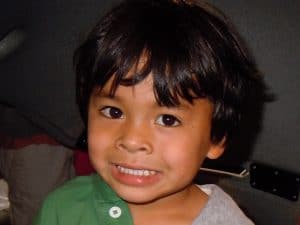
Lakas Shimizu
The first ten years of my job, my husband telecommuted. And it was my turn and I was the one commuting. I could no longer imagine commuting from Silicon Valley to Santa Barbara anymore: getting on the plane, or getting in the car, leaving my eldest son, alone.
Especially, when we were all struggling with the aftermath of Lakas’ sudden death.
I realized that I had to resign from my job, which was very difficult. Not only was I a full professor, but I also had tenure. It meant that I could pursue my own research agenda and have a certain place in academia.
I had to walk away and that was hard, and yet a good thing to do because I wanted to make sure that my job was opened up to the next generation, the next scholars who hopefully work in my field, sexuality, race and film, to replace me. I had to reevaluate my whole life.
So there was suddenly the loss of my wonderful son, which is the biggest loss for us, but there was also the loss of my identity as a professor and the loss of my home in terms of my work.
I was very fortunate that I secured a permanent professorship at San Francisco State University, and it was a jolt of life to be there.
The students are incredibly diverse, not only in terms of their sexual identity, their racial identity, their economic background, and also their aspirations. The past year was a very life-giving year for me, to return to my work, to honor my son’s life with acts and events that celebrated him. In my visiting status, I continued to contribute with my expertise, share my hard-won knowledge and pursue a robust research agenda. I realized I didn’t need institutions to continue my work. None of my accomplishments went away.
And at the same time, I definitely recognize the loss that formed my life. I also recognize, more than ever, the loss that other people also face. To be clear, I never think that there’s anything good that comes out of my son’s death.
What I mean is that I am no longer innocent in my understanding of life, that it coexists with death, and that, in the aftermath, we encounter both cruelty and kindness. It’s got nothing to do with his death but really in the way that we choose to live.
I realize that there are people who are really strong and are able to be with us and to help us and to remember Lakas and his wonderful fun-loving personality and generosity. And there are people I understand who cannot be with us because it’s too much to be around death. Either it’s the loss bringing something up in them, or it says a lot about their inability to help.
How do you deal with such an enormous loss on a day-to-day basis?
Yeah, it’s truly horrible, right? I know that there’s a new light in my work because of seeing death. A recent paper that I just finished I had been working on for maybe four years. It was about the death of Bruce Lee and how his wife Linda Lee wrote a memoir right after the death.
There was a sex scandal. He died in the bed of his purported mistress. The wife’s book was all about claiming his legacy as belonging only to her and her children. She was really consolidating her family and making sense of this tragedy. Thinking about what it meant to be in an interracial relationship at this time when interracial marriages were still illegal in many states.
He led this exceptional life where he was a celebrity and also a sex symbol.
But she shared so much of what we don’t know and what we cannot know. I was studying that in comparison with, in conversation with the soft porn feature film that his supposed mistress made.
She starred it and she cast a Bruce Lee look-a-like. It was meant to resuscitate her lover in a way. She reenacted what she said were the last days and last nights she spent with him, which were full of a kind of drug use, and alcohol, and sexual escapades.
Then she asserted they had the same ethnicity, same race, a kind of bond that his wife didn’t have. It was something special to her. I look at these works as works of grief in a way that I didn’t before. These women were trying to make sense of who they were and the loss they faced.
This is something that I had to do. I really had to think about why did I choose to have children? Why would I never regret that I had him? How could I look back at that life, and think of it as the best times of my life and still be able to go on?
To look at my eldest son and to say he has this amazing future ahead of him. That my husband and I have this passionate love that created our children. It is something that will feed us for the rest of our lives. There’s more ahead for us as well.
I think that’s how we do it. Whenever the waves of sadness come, I look into it and I feel it. I’m afraid of denying the pain. And I look at the pain as a manifestation of my love for my son whom I miss.
Give me a word that describes your journey so far.
A good friend of mine shared this word with me that I’m striving to achieve every day: equanimity. She defines it as, regardless of adoration or negation, you will hold steady. You will not be put out to sea. That really helped me.
I think it requires courage to look at oneself deep inside. And say there are these decisions that you made because they’re the right decision to make for your family. It was big to leave my job, and there’s going to be ups and downs. Somehow you figure out who you are, and consciously engage the people who are important to you and identify what you need as you forge your relationship.
And saying what you feel and what you need to those who are with you — whether it’s friends or family.
You’re very much a part of that, right?
Thank you, thank you. Yes, I feel very connected to you, even when we don’t see each other, even when I’m just brushing my teeth.
Exactly, because Lakas loves brushing his teeth.
Gosh, that’s right. Maybe that’s why. I do think of him a lot when we’re on a beach and in the water.
Last week was excruciatingly difficult for me because he was supposed to be on this fourth grade trip to Yosemite which he had been looking forward to forever. As soon as he became aware of it when he was four or five. It was a place that was really special to his grandma and special to our family. We had gone back together when he was five and he hiked seven miles on and off my husband’s back.
The kids [Lakas’s classmates] were there, this week. He was supposed to be there.
He would’ve really enjoyed it. So that’s on my mind a lot. Sometimes the pain is so hard, that I just have to sit through it. Go hiking and walk around.
A kid wrote to me last night, saying: “Hi, I’m in Lakas’s class, and I was watching the Warriors game. I thought of a pun, can you share it with Bayan?”
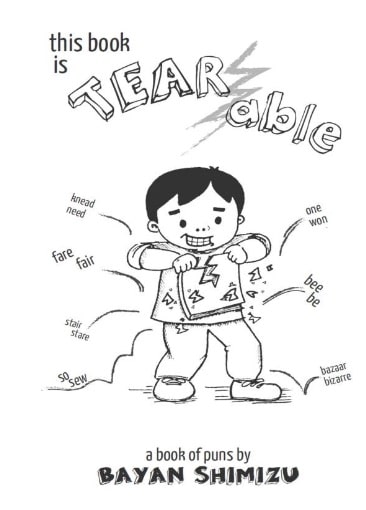
Bayan Shimizu – This Book is TEAR-able. Artwork by Amy Lin.
My son wrote two books of puns PUNishment (2014) and This Book is Tear-able (2015) to honor Lakas and the kids love it.
That was just perfect. Because it was both: I knew Lakas, he was my friend. He was part of my life. But it also was an acknowledgement of my older son Bayan and the power of creativity, to create wordplay and puns. When children reach out to him, the relationship continues — because in this way, Lakas continues to be alive.
For more on Celine Shimizu, visit her website.
impactmania published an earlier interview with Celine Shimizu’s sister, Rhacel Parreñas, at the Institute for Advanced Studies, Princeton.

